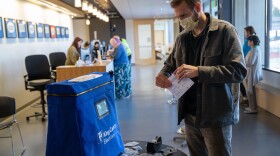
Pam Fessler
Pam Fessler is a correspondent on NPR's National Desk, where she covers poverty, philanthropy, and voting issues.
In her reporting at NPR, Fessler does stories on homelessness, hunger, affordable housing, and income inequality. She reports on what non-profit groups, the government, and others are doing to reduce poverty and how those efforts are working. Her poverty reporting was recognized with a 2011 First Place National Headliner Award.
Fessler also covers elections and voting, including efforts to make voting more accessible, accurate, and secure. She has done countless stories on everything from the debate over state voter identification laws to Russian hacking attempts and long lines at the polls.
After the Sept. 11 terrorist attacks, Fessler became NPR's first Homeland Security correspondent. For seven years, she reported on efforts to tighten security at ports, airports, and borders, and the debate over the impact on privacy and civil rights. She also reported on the government's response to Hurricane Katrina, The 9/11 Commission Report, Social Security, and the Census. Fessler was one of NPR's White House reporters during the Clinton and Bush administrations.
Before becoming a correspondent, Fessler was the acting senior editor on the Washington Desk and NPR's chief election editor. She coordinated all network coverage of the presidential, congressional, and state elections in 1996 and 1998. In her more than 25 years at NPR, Fessler has also been deputy Washington Desk editor and Midwest National Desk editor.
Earlier in her career, she was a senior writer at Congressional Quarterly magazine. Fessler worked there for 13 years as both a reporter and editor, covering tax, budget, and other news. She also worked as a budget specialist at the U.S. Office of Management and Budget, and was a reporter at The Record newspaper in Hackensack, New Jersey.
Fessler has a master's of public administration from the Maxwell School at Syracuse University and a bachelor's degree from Douglass College in New Jersey.
-
There is growing interest in expanding voting by mail, at least for the remainder of 2020, in order to keep poll workers and voters safe. But there are many challenges to pulling it off.
-
As the number of confirmed coronavirus cases continues to climb, election officials and candidates are weighing how to make sure the political process doesn't become the next casualty of the virus.
-
Some primary voters in California and Texas encountered long lines at voting locations on Super Tuesday. Officials cite mechanical problems with a new voting system and a higher-than-expected turnout.
-
With concern growing about the spread of the coronavirus, officials in a number of Super Tuesday states are taking extra precautions to assure voters that it's safe to go to the polls.
-
State officials are eager to emphasize the reliability of their equipment following the Iowa caucus debacle, where a flawed app delayed the reporting of accurate results for weeks.
-
U.S. intelligence officials are warning of Russian attempts to interfere with the 2020 elections.
-
An outside group is blanketing the nation with official-looking exhortations to register to vote. Actual elections officials don't agree whether that's ultimately helpful or harmful.
-
The Nevada Democratic Party chair has already said that what happened in Iowa would not happen in Nevada on Feb. 22, the date of its party caucuses.
-
One thing the history of leprosy tells us: When you restrict people's freedoms, they go underground, and fail to seek treatment.
-
As Democratic Party officials and election security experts dissect what happened Tuesday in Iowa, concerns are growing that similar failures could occur elsewhere.








